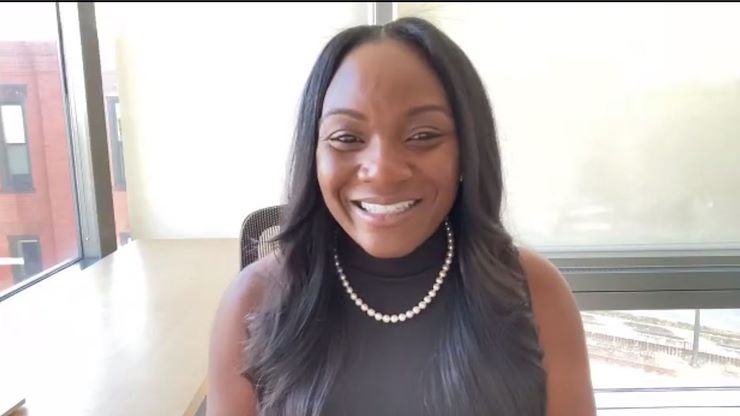
Dr. Kizzmekia Corbett, the lead scientist for the development of the Moderna vaccine, talks about the creation of the vaccine and her journey as a scientist during Montgomery County Community College's Annual Presidential Symposium on Diversity.
More than 400 participants gathered virtually via Zoom to meet American viral immunologist Dr. Kizzmekia Corbett and hear her discuss the development of the COVID-19 vaccine during Montgomery County Community College’s 12th Annual Presidential Symposium on Diversity.
The Symposium is a capstone event that advances and facilitates ongoing public dialogue on diversity and inclusiveness among students, faculty, staff and the community.
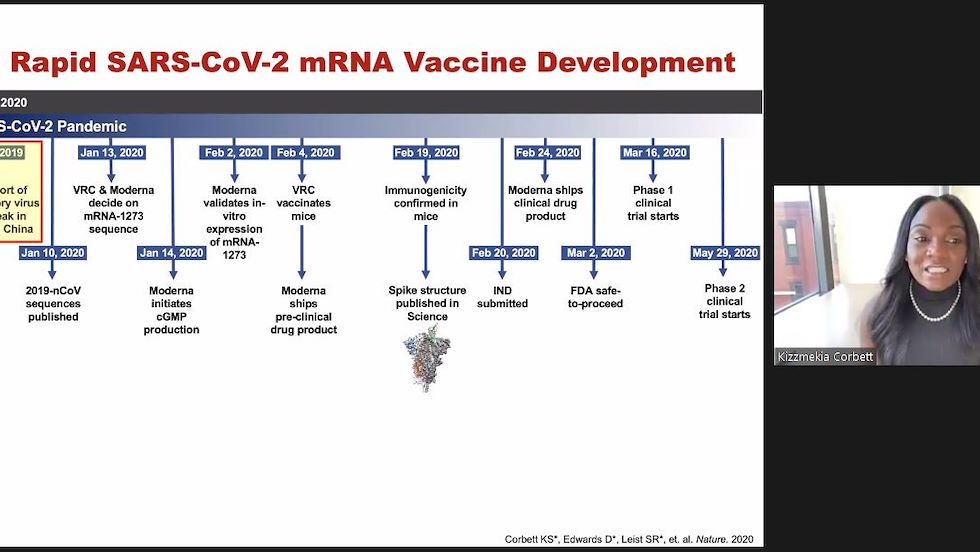 Dr. Corbett was one of the lead scientists who helped to develop the Moderna COVID-19
vaccine. She spent more than six years on the Coronavirus Vaccines & Immunopathogenesis
Team at the National Institutes of Health working on vaccines for coronaviruses, building
on decades of work to understand how the viruses function.
Dr. Corbett was one of the lead scientists who helped to develop the Moderna COVID-19
vaccine. She spent more than six years on the Coronavirus Vaccines & Immunopathogenesis
Team at the National Institutes of Health working on vaccines for coronaviruses, building
on decades of work to understand how the viruses function.
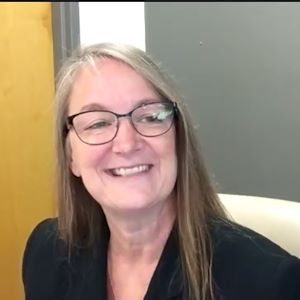 Following the introduction by MCCC President Dr. Victoria Bastecki-Perez, Dr. Corbett
started the event by thanking the students who participated in the public service
announcement contest. As a Vaccine Champion College, MCCC held the PSA contest to
help spread the message about the important role of vaccines. The audience viewed
the top five PSAs that now are displayed digitally around MCCC’s campuses and online.
Following the introduction by MCCC President Dr. Victoria Bastecki-Perez, Dr. Corbett
started the event by thanking the students who participated in the public service
announcement contest. As a Vaccine Champion College, MCCC held the PSA contest to
help spread the message about the important role of vaccines. The audience viewed
the top five PSAs that now are displayed digitally around MCCC’s campuses and online.
“That is where we are now – we have these vaccines and they work beautifully, and they are effective and safe, but we need to get the message and education out to the community, and it’s going to take a village, so to all the students who participated in the campaign, thank you for that,” Dr. Corbett said.
The race to create a COVID-19 vaccine, Dr. Corbett explained, was more of a marathon than a sprint, involving years of research that occurred long before the world even heard about COVID-19. A large amount of the research work was done between 2013 and 2019 with the MERS-CoV and SARS viruses.
Becoming a scientist, she explained, was not a rapid development either. It was a long road, she said, but one that was well worth it.
“The trajectory to become a scientist started a very long time ago when I was in high school. I took a very windy road to the point where I went to undergrad at the University of Maryland, Baltimore County, and then earned a Ph.D. at the University of North Carolina at Chapel Hill, and I even took a year off before getting a Ph.D. Then, I did a fellowship for six years at the National Institutes of Health,” said Dr. Corbett, who is now an assistant professor at the Harvard T.H. Chan School of Public Health.
During her presentation, Dr. Corbett shared how coronaviruses are a family of viruses and that both MERS and SARS had caused smaller pandemics.
“We knew that this could happen, and we knew that viruses could have this pandemic potential, and the type of virus that could be poised to cause a pandemic was a SARS-type virus,” she said. “I like to think of the SARS emergence in 2019 as the virus’s way of saying, ‘I told you so.’ We really did not pay attention to the signs that were in the history of this virus family.”
As of the time of her presentation, COVID cases reached 241,745,902, which resulted in nearly 5 million deaths globally. To squash the virus, she said, it would take 60 to 70 percent of the population to be immune, and, if that immunity relied on COVID infection, more than 40 million people could die.
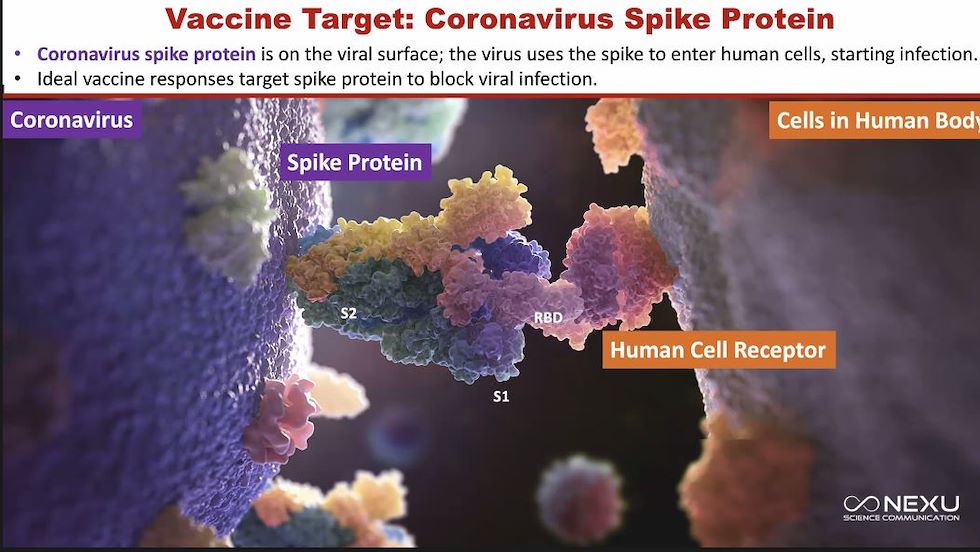 However, because of the research done on coronaviruses, scientists already had a method
that helped with the development of the vaccine for COVID-19. Using the template for
the SARS vaccine, they were able to swap in the genetic code to make it work for the
new virus, she said. She further explained how the vaccine targeted the coronavirus
spike protein on the viral surface to block the viral infection.
However, because of the research done on coronaviruses, scientists already had a method
that helped with the development of the vaccine for COVID-19. Using the template for
the SARS vaccine, they were able to swap in the genetic code to make it work for the
new virus, she said. She further explained how the vaccine targeted the coronavirus
spike protein on the viral surface to block the viral infection.
“I know it seems like I’m skipping over so much science, and that is actually the case—so much science went into the preclinical steps of this vaccine development in order for it to be authorized to go into a phase-1 clinical trial,” she said.
In addition to the vaccine research, Moderna already had processes in place to make the mRNA-1273 vaccine, which aided in getting the vaccine quickly to the clinical stage of testing.
Dr. Corbett explained how the vaccine was tested through levels of clinical trials and proven safe and effective. She said more than 6,687,049,429 doses have been administered worldwide.
She also explained the research behind why a booster is necessary to help protect people, particularly those who are more susceptible to the variant strain, including the elderly and those who are immunocompromised.
“Boosting increases the antibody responses both to the ancestral strain and then also for the variant strain,” she said.
Even with some of the antibody responses waning and the circulation of some variants, the vaccines continue to protect people. People in the 18-55 age group, for example, are not presenting with severe disease because they still have many antibodies. However, older people and those immunocompromised are seeing some breakthrough infection into the lower airway, which is why the FDA is recommending booster shots for them.
Following the presentation, Rose Makofske, MCCC Director of Equity, Diversity and Inclusion & Title IX Coordinator, thanked Dr. Corbett.
“I’ve always respected science, but you have made me have a completely newfound respect for science and scientists, and your passion for what you do is very clear,” Makofske said.
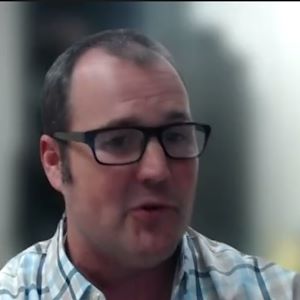 Dr. Corbett then answered several questions from the audience as posed by moderator
Iain Campbell, MCCC Cultural Affairs Program Coordinator.
Dr. Corbett then answered several questions from the audience as posed by moderator
Iain Campbell, MCCC Cultural Affairs Program Coordinator.
One of the first questions was about what elevator speech does she use to convince someone to get a vaccine.
“So I don’t start with an elevator speech,” she said. “I always ask people what their specific concerns are and then I address that very specifically. I think at this point, almost two years since the vaccine development started, people who are still hesitant, or as I like to say, are inquisitive about the vaccine, have a particular issue, or heard a particular thing. So, I would like to empathize with whatever is specific for them.
“And, generally, I start by saying that while this technology seems new to you, it is not new to us on the science side, and it was started in development several years ago because we understood from our MERS coronavirus efforts,” she said.
For the last 30 minutes, she answered several questions concerning boosters, vaccine hesitancy, whether an annual shot will be needed, etc. At the end, she was asked what advice she would give to students who are pursuing a science degree, knowing how long the journey takes.
“When I wake up in the morning, and I first see myself in the mirror, I say ‘you are smart, you are beautiful and you have a voice,’ and so making sure that you affirm to yourself that I am a scientist every single day really does help,” she said.
